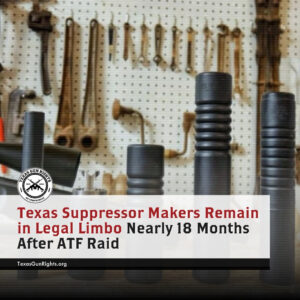The federal government has repeatedly denied the existence of a centralized gun registry.
But in reality, not only does one exist—it’s now on the verge of becoming far more dangerous.
Thanks to a series of Freedom of Information Act (FOIA) requests filed by Gun Owners of America (GOA) in recent years, Americans have learned that the ATF currently possesses nearly 1 billion firearm transfer records—digitized, indexed, and ready to be exploited.
And now, with the federal government’s new artificial intelligence (AI) initiative, those records may soon be ingested into federally controlled machine learning models—without safeguards, oversight, or public accountability.
That isn’t just a violation of federal law. It’s a direct threat to the privacy and liberty of millions of gun owners across this country.
The Registry That Shouldn’t Exist
Federal law—specifically 18 U.S.C. § 926(a)(3)—explicitly prohibits the creation or maintenance of any centralized registry of firearms or gun owners.
Yet the ATF continues to collect millions of records every month from closed gun dealers, storing each one in its Out-of-Business Records Imaging System (OBRIS).
These records include personal details, firearm descriptions, serial numbers, and addresses from ATF Form 4473s.
While the ATF insists the data is “not searchable by name,” GOA’s investigation revealed that the search function is merely disabled, not deleted—meaning that with a simple policy change, the government could activate full search capability and turn a passive database into an active registry.
Registries like these don’t just pose theoretical concerns. History shows us that registration is always the first step toward confiscation. From Australia to Canada to the United Kingdom, each case followed a predictable pattern: register, restrict, confiscate.
AI Integration Supercharges the Threat
In a recent policy statement, Michael Kratsios, Director of the White House Office of Science and Technology Policy, confirmed that “all government data” will be ingested into AI systems for use in everything from tax processing to permit management.
This sweeping strategy—without any carve-out for sensitive firearms data—raises significant red flags.
If the ATF’s gun registry becomes part of these government models, it will be subject to enhanced pattern recognition, predictive analytics, and automated querying that far exceed the capabilities of a human bureaucrat.
Even more troubling, there’s no statutory protection in place to prevent such misuse. No firewall. No explicit exclusion. Just blind trust that unelected agencies will “do the right thing.”
Pushback in Congress: The No REGISTRY Rights Act
Fortunately, some in Congress are paying attention.
Rep. Michael Cloud (R-TX) and Sen. Jim Risch (R-ID) have reintroduced the No REGISTRY Rights Act, legislation designed to dismantle the ATF’s illegal registry and permanently prohibit the creation of any future government-run firearms database.
The bill has three key components:
Destruction of the existing registry (including the 920+ million records in OBRIS)
Repeal of Biden-era rules that forced permanent record retention by dealers
A prohibition on any federal registry, now or in the future
This effort is backed by Texas Gun Rights, one of the most active state-level pro-gun organizations in America, as well as its national affiliate, the National Association for Gun Rights (NAGR)—a group known for its no-compromise stance on the Second Amendment.
The Bottom Line: The Registry Must End
It’s no longer enough to say, “They’re not coming for your guns.”
When the government has a searchable database of who owns what—and when—it’s only a matter of time before that data is weaponized.
This is not speculation. It’s a historical precedent.
The combination of AI-powered surveillance tools and an illegal, digitized registry presents one of the gravest threats to gun rights we’ve seen in decades. And any attempt to feed gun owner data into AI systems must be stopped before it starts.
Because if we allow government algorithms to track the guns, they’ll soon come to take them, too.







